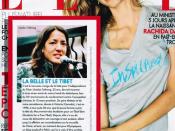Christine Lee
Reel Research: Screen and Scholarship
3/11/2012
Legally Blonde: Feminist Film Theory
Feminism is a movement that has had a great impact in the world of film, and how we interpret it. During the second wave of feminism that occurred throughout the United States, feminist scholars began developing and applying more theories, that arose during this movement, to the way they analyzed film. The various tactics and topics that are contained under the umbrella of feminist film theory are, but not limited to, sexism, female stereotypes, and gender discrimination. Though these are issues that were more prominent during the post world war II era, they are themes that are internalized in modern day movies. Robert Luketic's Legally Blonde, is an archetypal example of a film that depicts the countless stereotypes created by society, a few being gender roles, blondes vs. brunettes, and the many stereotypes of women.
Timothy Corrigan and Patricia White's work, The Film Experience, states that the difference between the sexes is culturally internalized and valued. It might not be apparent, but parents establish these values while we are children. Girls are handed Barbie Dolls, play house, and are raised to believe that they should be the beautiful stay-at-home trophy wives. Boys on the other hand are taught to be aggressive and become the breadwinners of a family. This stereotype of gender roles is first introduced in Legally Blonde when the main character Elle Woods tells her parents she wants to attend Harvard Law School in a pursuit to win back her boyfriend Warner Huntington III. When the first glimpse of her father is shown, he is holding a martini and appears to be an older gentleman as well as incredibly rich. When we're introduced to her mother it is apparent that she is the...


